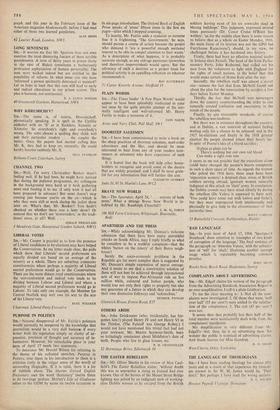THE EASTER REBELLION
SIR,—Mr. Oliver Martin in his review of Max Caul- field's The Easter Rebellion states: 'without doubt this was as unpopular a rising as Ireland had ever known. One of the heroes of the Mount Street Bridge fighting was pelted by an indignant mob of working- class Dublin women as he escaped from the British
soldiers leaving most of his six comrades dead in blazing buildings.' This judgment, expressed several times previously (Dr. Conor Cruise O'Brien has written: 'as for the middle class there is some reason to believe that as a whole on Easter Monday, 1916, the main focus of its interest was not the GPO but Fairyhouse Racecourse'), should, in my view, be challenged before it has hardened into history.
Firstly, there had been no effective national leader in Ireland since Parnell. The head of the Irish Parlia- mentary Party, John Redmond, had called out his men from the volunteers to fight with England for the rights of small nations, in the belief that this would make certain of Home Rule after the war.
Secondly, the rebellion itself was almost a secret one—witness the fact that Eoin McNeill found out about the plan for the insurrection by accident a few days before Easter Monday.
Thirdly, the fact that McNeill sent messengers down the country countermanding the order to rise naturally created confusion and uncertainty in the minds of the people.
Finally, by any reasonable standards, of course the rebellion was madness.
But there was in existence throughout the country, and in Dublin, a vast reservoir of national feeling waiting only for a chance to be released; and in the 1917 by-elebtions and finally in the 1918 general election the people showed where their hearts lay. In spite of Pearse's idea of a blood sacrifice: 0 plain as plain can be There's nothing but our own red blood Can make a right rose tree it seems to me not possible that the executions alone could have changed the people's hearts completely in such a short space of time. As regards the women who pelted the 1916 hero, these must have been 'separation women,'- a despised class, wives of British soldiers serving abroad, ignorant women naturally indignant at this attack on 'their' army. In conclusion, the Dublin crowds may have stood silently by during the rebellion (De Valera is supposed to have said, 'You could have come out with knives and forks'), but they were unprepared both intellectually and physically to give help in the circumstances of that particular time.
MALyr )1.1.














































 Previous page
Previous page